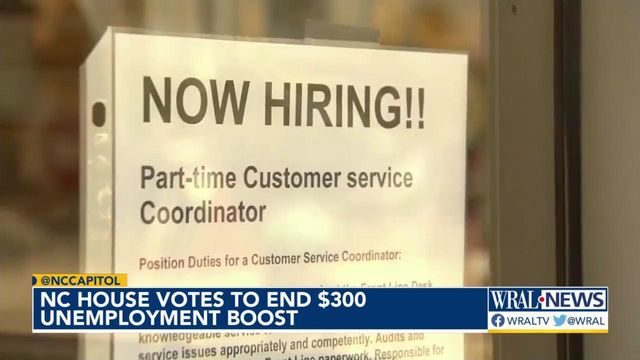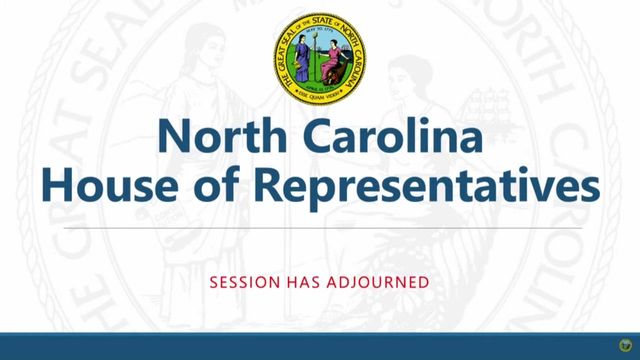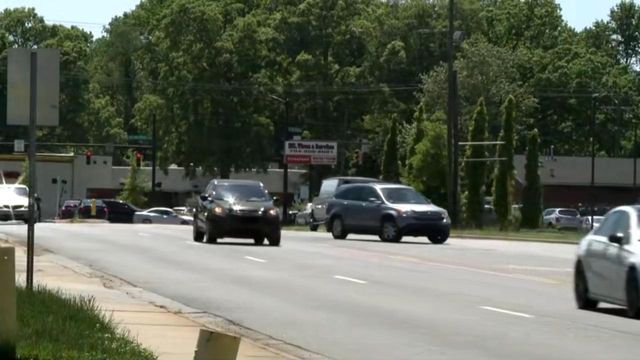NC House votes to cut $300 weekly federal jobless aid
State House lawmakers have passed a bill that would remove the state from the Federal Pandemic Unemployment Compensation program.
Senate Bill 116 now goes back to the Senate, which could decide to approve it in one vote. If it becomes law, North Carolina would join 25 other states that have also canceled their benefits early.
According to the NC Department of Commerce, about a quarter million unemployed workers in North Carolina are currently receiving the benefit, worth $300 per week, adding up to between $72 and $75 million federal dollars pumped into the state's economy each week.
Withdrawing from the program early would mean the loss of around $500 million in federal aid by the program's scheduled end September 6th.
Republican House Speaker Tim Moore argued the additional money is keeping workers at home. He says a shortage of workers is slowing the state's economic recovery and putting businesses in jeopardy at the very time they're trying to get back on their feet.
"We should not have a system in place that has been thrust upon us by this federal program where folks are incentivized not to work," Moore said. "It doesn't make sense. It's not how we can operate this economy."
"The state of South Carolina is already doing this. And as a result, what's happening? Folks are going back to work, their economy is surging ahead of us," Moore said. "If we don't make these changes, their beach communities are going to do better, not just this year but in years to come because of this."
Democrats pointed out that South Carolina's unemployment rate is actually higher than North Carolina's, which is just 4.4%.
"If you take out the anecdotes and look at the data, our unemployment rate is falling is falling month over month. It's falling week over week. We're doing better than South Carolina, and we're doing better than the national average," sad Rep Brandon Lofton, D-Mecklenburg.
"Don't put this at the feet of the straw-man argument that people are sitting at home lazy because they don't want to go to work," countered Rep. Wesley Harris, D-Mecklenburg. "There's no conclusive evidence that the unemployment insurance is the reason people aren't returning to work."
But Rep. Brenden Jones said he wasn't in any doubt that the federal checks are behind the labor shortage in his rural district.
"Your small towns will not be here if this continues," said Jones, R-Columbus. "Your small businesses are eroding and there's every one of you can ride down the street. and you're seeing doors closed like you never thought."
Harris cited lack of available and affordable child care as one of the main reasons many workers, especially women, have not yet returned to work. And he noted the recovery is still in progress in many areas.
"We do not need to cut off the legs of the people who need this the most. We're two months away from this solving itself," Harris said. "Cutting this off now is just plain cruel, and I don't think we should do it."
The bill also gives a tax break to people who collected jobless benefits, as well as to business owners who would be able to deduct the businesses expenses they used PPP money to pay for. That's been a problematic issue for some in the House, and the Senate has so far refused to consider it, though supporters note 48 other states are already allowing it.
Under the bill, FPUC benefits would end 30 days after it becomes law.
The 71-34 vote was largely along party lines, with seven Democrats joining all Republicans in support.
Moore, R-Cleveland, had tried to attract Democratic votes by adding a provision that would use $250 million in federal ARP relief funds to help pay for daycare subsidies for workers returning to the job market. But opponents noted that the money was already earmarked for that purpose.
Governor Roy Cooper has not yet said whether he would veto the bill if it reaches his desk.











